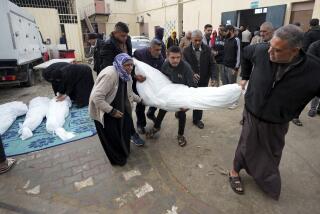Iraq’s U.S. Leader Arrives
- Share via
BAGHDAD — The retired American army general charged with managing postwar Iraq arrived in Baghdad for the first time Monday, touring a battered and fragmenting city that craves U.S. help but dreads U.S. domination.
Accompanied by heavily armed soldiers, Lt. Gen. Jay Garner arrived to officially assume his role as administrator of Iraq, heading an ambitious and costly U.S. plan to rebuild the country’s infrastructure, reshape its government and overhaul its economic, educational and political systems.
Garner steps into a void in which conservative Shiite Muslim religious leaders and returning Iraqi exiles are already appointing themselves as mayors and security forces, where people have high expectations but are highly mistrustful of an American military man and worry that the country will be headed by a puppet regime.
Those concerns were dramatized Monday when several thousand people took to the streets in central Baghdad to protest the reported arrest of a leading Shiite religious leader, Sheik Mohammed Fartusi, whose Al Hawza movement has been trying to cement control over hospitals and other civic institutions in the capital.
U.S. officials refused to confirm Fartusi’s arrest. If true, it could represent a first step by American forces to clamp down on efforts by Shiite leaders to exert political control now that the regime of Saddam Hussein has been toppled.
Pentagon officials in Washington did confirm another arrest, that of Muhammad Hazma Zubaydi, a high-ranking member of Hussein’s regime. Zubaydi is said to have been in charge of the brutal crackdown on Shiite Muslims in southern Iraq after the 1991 Persian Gulf War.
Also Monday, Defense Secretary Donald H. Rumsfeld indicated that the U.S. military is not planning to establish long-term bases in Iraq.
“The likelihood of it seems to me to be so low,” Rumsfeld said, suggesting that the United States would more likely use bases in other Middle Eastern countries. “We’ve got all kinds of options and opportunities in that part of the world to locate forces.”
Rumsfeld, along with other U.S. officials, refused to comment on a report that an Iraqi scientist has directed U.S. search teams to sites where materials to make chemical weapons were said to be buried in the weeks leading up to the war.
Several officials expressed caution about the report, which first appeared in the New York Times on Monday, noting that previous weapons “finds” have proved false. U.S. military search teams have found no banned chemical, biological or nuclear weapons in Iraq since the war started last month.
“I’ve believed all along we’re not likely to stumble over anything,” Rumsfeld said. Rather, he said, U.S. forces must depend on knowledgeable Iraqi scientists and others who are willing to share information on banned weapons.
“And we will obviously look with favor on people that do that,” he added.
Garner’s arrival in Baghdad marked a milestone in the U.S. postwar campaign to rebuild and restructure Iraq, although it was greeted with skepticism by many Iraqis. Some said they knew little about Garner and held out no hope that he would improve their lives. Others said he may have arrived too late to have the influence necessary to counter the forces already rising to replace Hussein’s regime.
‘It’s a Great Day’
“It’s a great day to be here,” Garner said after landing at the Baghdad airport on a C-130 from Kuwait, where he and his staff have spent the last few weeks awaiting U.S. military security clearance to enter Iraq.
“What better thing than to be able to help somebody, affect other people. That’s what we intend to do.”
Garner, 65, a blunt-talking defense contractor, oversees the Office of Reconstruction and Humanitarian Assistance, which was created by the White House in January. He has sought to dispel its image as a colonizing occupation government.
His plan divides Iraq into three sectors -- the north, which is largely Kurdish; central, which includes Baghdad and is dominated by the Sunni Muslim minority that has run the country for decades; and the heavily Shiite south. Garner will eventually bring a staff of 500 to the capital. Advisors will be set up as shadow ministers in each government ministry, while technicians assess immediate health and public utility needs.
Speaking to reporters, Garner declined to specify a timetable. “I don’t think I would put 90 days as a mark on the wall, but we will be here as long as it takes,” he said. “But we’ll leave fairly rapidly.”
First on Garner’s tour Monday was the beleaguered Yarmuk Hospital, the largest medical facility in western Baghdad, where -- like at most hospitals in the city -- Shiite gunmen have installed themselves as vigilantes to defend against looters and instill a stronger respect for Islam.
The hospital received scores of casualties during the war, and its maternity ward was heavily damaged by an American tank shell. Since just before the fall of Baghdad, however, a lack of electricity and water has forced the hospital to limit its treatment to emergency patients only.
The hospital seemed emblematic of the problems facing Garner.
Among the people he spoke to was Dr. Haider Abid, the strapping and articulate chief resident. Speaking later in an interview, Abid recounted the promises that Garner made: to foster justice and the rule of law, to rebuild all hospitals, to repair the sewage system.
“Many promises,” Abid said, “but I trust in them. It’s the only way for this city to live.”
But what really mattered to Abid was whether Garner will be able to assert his authority and bring civil order to Baghdad. At Abid’s hospital alone, 20 armed Shiites arrived about a week ago and declared themselves in charge. Abid, who presumed there was a political agenda behind such acts, said he hoped the vigilantes would have second thoughts now that Garner has arrived.
“This makes all of those people step away and shut their mouths,” he said.
Abid summed up the running power struggles in Baghdad with a joke: At the ransacked Health Ministry, a gigantic building strewn with trash, there is no longer a minister; instead, every floor has a minister. The reality behind the joke is that, without central authority, there are no supplies, no medicine and no direction.
A few minutes after Abid spoke, a rotund, bearded sheik in plastic sandals and red-checked kaffiyeh presented himself to reporters. Sheik Mafouk Shmousy declared that he and his gunmen have taken over the hospital on orders of the Shiite religious authority based in the holy city of Najaf.
Shmousy said he and his men will make sure patients are safe and will “keep an eye” on the doctors and nurses to make sure they are not “corrupt.” Some religious leaders have said it is time for women to be required to cover their heads and for all Iraqis to obey the Koran, anathema to many in the country, which has long held to a secular way of life.
“We have to make some changes that take us away from the previous government, and bear in mind that Islam is involved now,” Shmousy said. “Anything that contradicts or interferes with the Islamic way will be totally rejected. We will not be governed by any foreign or Western element.”
It was not clear whether Shmousy had links to Fartusi, the religious leader who was said to have been arrested, but they clearly represent the same phenomenon: the effort by the long- repressed Shiite majority in Iraq to lay claim to the power that many believe is rightfully its.
The peaceful protest on Fartusi’s behalf was held in the same square where a statue of Hussein was torn down April 9 in a widely photographed celebration of U.S. forces arriving in Baghdad. It formed quickly and dispersed quickly as U.S. soldiers looked on warily. A follower of Fartusi, Sheik Hussein Assadi, told the British Broadcasting Corp. that Americans should be wary of offending Shiite sensibilities or “otherwise there will be an explosion.”
Garner and his entourage also toured a water and sewage treatment plant and the city’s main power plant, where they heard from the U.S. Army Corps of Engineers that up to 10% of the city’s electricity was to be restored by Monday night. Electricity is still out in most of the capital, which means no phones, no TV and no refrigeration.
Garner was to spend the night at the yellow, moat-surrounded Faw Palace amid the ruins of one of Saddam Hussein’s favorite compounds.
Garner will have to confront the Shiites while dealing with the fact that the Pentagon’s preferred choices to run Iraq -- Ahmad Chalabi and the exiled Iraqi National Congress -- have failed thus far to win a following.
Chalabi’s choice as “mayor,” Mohammed Zubeidi, another exile, has been criticized here and abroad for attempting to insinuate himself into local politics. And on Monday, Garner’s representative for Baghdad, former U.S. Ambassador to Yemen Barbara Bodine, said Washington does not recognize Zubeidi.
“We don’t really know much about him except that he’s declared himself mayor,” Bodine said during her tour with Garner.
A spokesman for Chalabi said the INC and its military arm, the Free Iraqi Forces, are contacting various Iraqi groups and in some cases acting as liaison between Iraqis and Americans. Among the groups Chalabi has seen are former officers of the Iraqi army, the Republican Guard and the Special Republican Guard, said Zaab Setma, a Chalabi advisor and spokesman.
Chalabi, a businessman with a long history of opposition to the Iraqi regime, returned to Baghdad last week after more than 40 years living outside the country and set up operations in a former sports club in the Mansour district. He has been greeted with suspicion, ambivalence and hostility.
Seeking Leads on ‘Thugs’
Setma said the INC is seeking leads on the “killers and thugs” of the old regime. He also confirmed that the INC believes that Hussein himself is still in Iraq. “We will find him,” Setma said. “We’ve had many reports.”
Already, Setma said, the INC has turned over to the Americans a senior Iraqi intelligence officer, Khalil Ibrahim Nasseri. And while U.S. officials did not describe the circumstances of Monday’s arrest of Zubaydi, the senior Hussein associate, Abu Dhabi television reported that it was the INC that seized him in Hillah, south of Baghdad, and turned him over to Americans.
Zubaydi was described by one U.S. official, speaking on condition of anonymity, as “an old-time Saddam crony” who had worked closely with Hussein for nearly 40 years. He served as prime minister and held other positions, but retired from the Revolutionary Command Council in 2001 and is not believed to have held any formal government positions since.
Zubaydi, the queen of spades in the deck of playing cards depicting the most-wanted Iraqis issued by the U.S. military, is a Shiite Muslim but is reviled for having put down an uprising by Shiites in southern Iraq in 1991. Tens of thousands are believed to have died in the crackdown.
“There is videotape of him kicking and beating captured Shia dissidents in 1991,” according to the U.S. official.
*
Times staff writers John Daniszewski in Baghdad and Greg Miller and Maura Reynolds in Washington contributed to this report.
More to Read
Sign up for Essential California
The most important California stories and recommendations in your inbox every morning.
You may occasionally receive promotional content from the Los Angeles Times.











